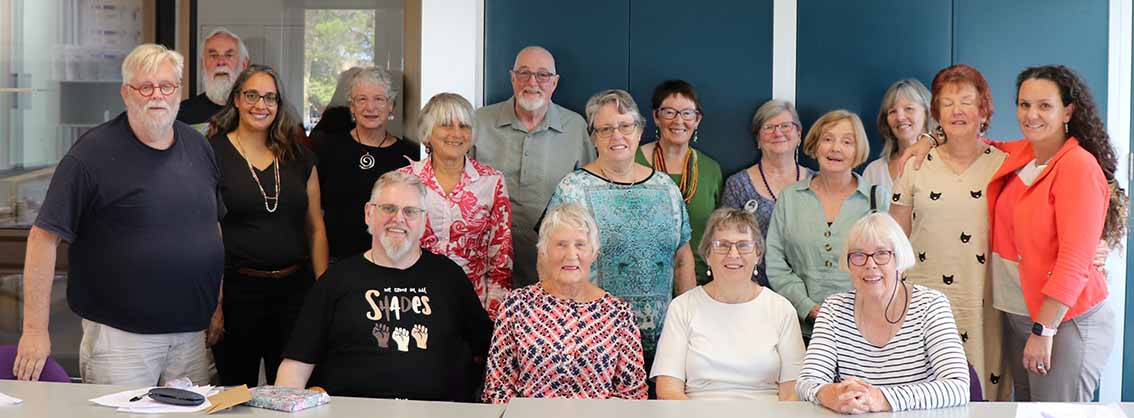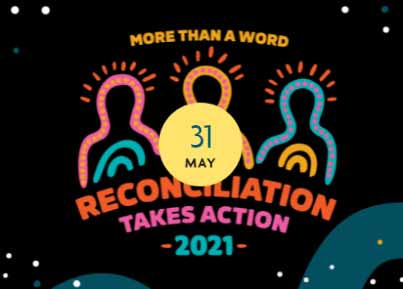IN 2007, Patrice Mahoney*, a Ngayaywana woman from NSW who lives in Bass Coast, invited dozens of people to a meeting in Inverloch. Those invited were from local neighbourhood houses, hospitals, welfare agencies, community leaders, schools and the council.
Patrice stood up and said “Okay, you white fellas, what are you doing about us black fellas?”
It was a defining moment for me. That day I became a member of the Bass Coast/ South Gippsland Reconciliation Group.
In secondary school I studied British history which included the discovery of Australia by Captain James Cook. In the late 18th century, Britain began shipping prisoners to provide the labour to establish a colony in the southern hemisphere. I did not question how the arrival affected the “natives” who lived here. I did not ask how we could just take their land. I didn’t question if there was any resistance to the British appearing on their shores.
Although not stated, at that time, it was felt people of another colour, that is not white, were inferior.
In my secondary school years, after the end of the Second World War, the school sponsored two English girls to be educated. Certainly no consideration was given for the opportunity to educate two Aboriginal girls.
| I did not know that Aboriginal men went overseas to fight in the Second World War. White returned servicemen were offered land to farm on their return to Australia but this offer was not extended to Aboriginal servicemen. It did not matter that their ancestors had cared for the land for millennia. They were unable to join their mates at the local pub because they were black. They did not receive a pension after discharge. They could not become members of the Returned Servicemen’s League. When I attended Melbourne University in the 1950s I did not ever see a black person, let alone an Aboriginal person. I do not recall ever seeing an Aboriginal person when I worked in the outpatients of public hospitals. At this same time, we did not know children were being taken away from their Aboriginal parents. It was thought at the time that the children could be saved from their Aboriginal life and become like white children. Nobody was concerned about the grieving of the parents or the distress of the children being away from family and country. When the children were about 16 years old, they were sent to white households to do domestic duties. They were deprived of any opportunity to reconnect with country. | National Sorry Day on May 26 acknowledges the mistreatment of Aboriginal and Torres Strait Islander people who were forcibly removed from their families and communities. It heralds the start of Reconciliation Week. Mon, May 31, 11am-2pm Walk Together for Reconciliation: Welcome to Country and Smoking Ceremony and a walk across the bridge from San Remo to Newhaven. Speeches, music and barbecue. Hosted by Bass Coast Reconciliation Network. |
In the early 1960s we read about the Freedom Riders. Led by Aboriginal activist Charlie Perkins, they rode through outback towns where there was racial discrimination. They particularly drew the attention of the media to the situation that Aboriginal children could not swim in the town swimming pools with white children. They were banned from the changing rooms.
In 1966 Vincent Lingiari led 200 courageous Aboriginal stockmen and their families to seek better conditions on the white owned stations.
This was the prelude to the Referendum in 1967 which asked Australians the question whether Aboriginal people should be included in the Census. Australians overwhelmingly voted yes. Until then they were listed under the flora and fauna.
In 1976 there was the first attempt by an Australian government to legally recognise the Aboriginal system of land ownership and put into law the concept of inalienable freehold title.
In 1986 my husband Bob and I went for our first trip to Central Australia. When I saw the Macdonell Ranges I was in awe. In our many subsequent camping holidays out country, I experienced the power of the landscape and understood the dreamtime stories of the First People and the magic and beauty of the night sky. I understood their connection to country and was humbled.
When we walked around Alice Springs it was the first time I had seen Aboriginal Australians. I was saddened to see them wandering aimlessly around the streets, looking disconnected and dispirited. To me Alice Springs was a sad and troubled town. Racism and segregation was there for all to see.
In 1988 Australia celebrated 200 years of white settlement since Arthur Phillip established the colony in the name of England. For Aboriginal people it was the day they were invaded. I remember with shame the morning I stood next to the Phillip Island Shire President’s wife, Ruby Gates, an Aboriginal woman, during a re-enactment at Rhyll of the first fleet landing on the beach. How alone and sad Ruby must have felt that day but I failed to sense her pain.
In 2018 when NAIDOC week was celebrated at Churchill Island, the late Ruby Gates’s family was presented with an award for her involvement and contribution to the community of Phillip Island. I was grateful for the opportunity to tell those present of the heartless experience Ruby had to endure that morning in Rhyll in 1988.
In the early 1990s there was a Royal Commission into Aboriginal Deaths in Custody.
For the first time people were talking about the Frontier Wars. Aboriginal people had not quietly acquiesced to the white invaders but had put up powerful resistance.
In June 1992, the High Court of Australia recognised that Aboriginal and Torres Strait Islander peoples have rights to the land – rights that existed before the British arrived and can still exist today.
Then in December 1992 Paul Keating, the Prime Minister, made a speech that resonated with me in a powerful way. The speech was in response to the International Year of the World’s Indigenous People and was delivered in Redfern, NSW, in front of a predominantly Aboriginal audience:
“The starting point might be to recognise that the problem starts with non-aboriginal Australians
It begins with the act of recognition
Recognise that it was we who did the dispossessing
We took the traditional lands and smashed the traditional way of life
We brought the diseases. The alcohol.
We committed the murders
We took the children from their mothers
We practised discrimination and exclusion.
It was our ignorance and prejudice
And our failure to imagine these things done to us
With some noble exceptions, we failed to make the most basic human response and enter into their hearts and minds.
We failed to ask – how would I have felt if this was done to me?
As a consequence, we failed to see what we were doing and degraded all of us.”
I will never know.
* Last year Patrice Mahoney was awarded the Medal of the Order of Australia for her work in promoting awareness and acknowledgement of the Indigenous community in Bass Coast. In the new role of Aboriginal Development Officer for Bass Coast Shire, she is helping to develop the shire’s first Reconciliation Action Plan.

